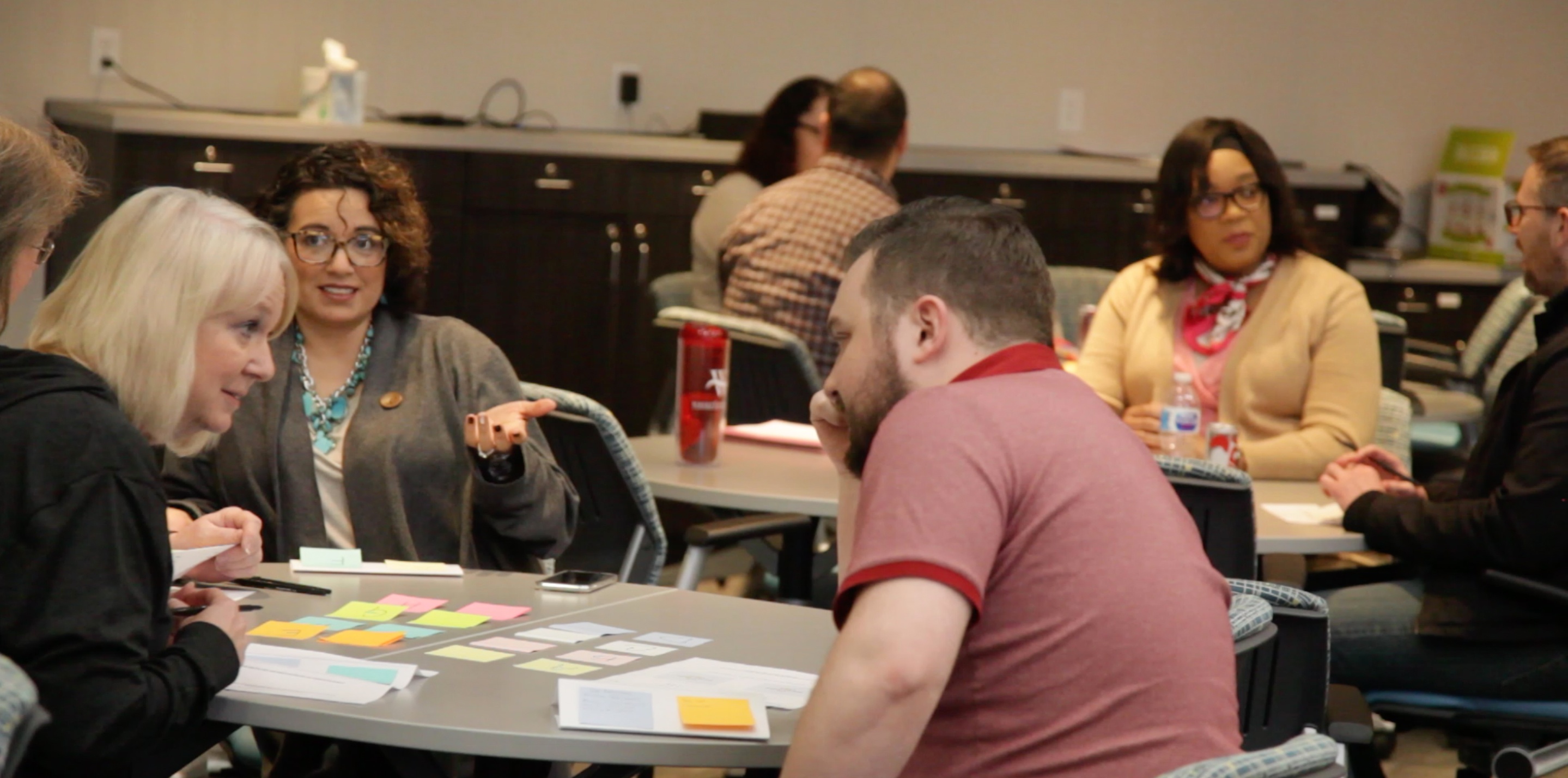Within a group, a team, a network, or organization that relies on members being connected to one another, connections can be based on a number of factors but almost always rely on the availability, awareness, and mobility of knowledge or information essential to the group. How does information move within a group or across groups? We are interested in identifying catalyzing actions that occur in group interactions to facilitate the ease of information and knowledge exchange and the establishment of new connections of members in the group. Research suggests that ideas have value to the extent that they can be shared with a new or different audience (Burt, 2004). This research also suggests that individuals who can establish new connections within a group bring competitive advantage to the development of new ideas within that group. In our experience, the purposeful translation of ideas to new audiences reduces serendipitous connections and takes advantage of certain individuals’ natural tendencies to broker these connections.
Read More »Blog
Mapping Expertise and Illuminating Dark Assets
At some point in your life, you’ve found yourself describing a project you’ve worked on to a friend. They interject, “I’ve done something similar to this before,” and go on to describe a field or skill you didn’t know they were familiar with. You’ve just uncovered some dark assets about your friend: a set of skills or knowledge that were only discovered due to an accidental trigger.
Read More »In Stanley Kubrick’s famous film based on Arthur C. Clark’s book, 2001: A Space Odyssey, a mysterious black monolith appears on Earth millions of years before modern humans. It’s the classic “black box.” We don’t know who made it, what’s in it, or how it works, but it’s miraculous and powerful and somehow results in jumpstarting the entire evolution of humankind.
Read More »Mapping Science Networks and Projects to Limit the Rise in Global Temperatures
When the United Nations released a report earlier this year that a catastrophic two-degree Celsius (3.6-degree Fahrenheit) rise in global average temperatures is expected to occur in the next decade, there was a media firestorm about the dire predictions. You know who wasn’t surprised? Climate scientists. (Read about the difference a half-a-degree can make.)
Read More »Finding Balance on the Spectrum Between Lone Geniuses and Team Scientists
James Verdier: Hi, I'm James Verdier and welcome to the American Institute of Biological Sciences’ BioScience Talks which is a forum for integrating the life sciences. On the second Wednesday of each month we discuss the latest bioscience publications. And as a reminder if you'd like to read more point your browser to academic.oup.com/bioscience.
Read More »Using Science to Build a Dynamic Collaboration Engine
“Good ideas are getting harder to find,” Exaptive CEO Dave King quotes from a recent paper by MIT and Stanford researchers. He points to the skyrocketing number of researchers employed in the U.S. and contrasts it with the inverse slope on a chart monitoring efficiency of researchers along the same timeline. “Those growing number of researchers are failing to produce value that outpaces what we’re spending to innovate.”
Read More »Optimizing a Team for Innovation or The Origins of the Sticky Note Exercise
So many fantastic quotes are attributed to Albert Einstein. If you hear our CEO Dave King speak, he may bring up his favorite: “Combinatory play seems to be the essential feature in productive thought.” To have an aha moment, we have to play with a challenge from a variety of perspectives. We have to build collaborative teams to tackle complex problems.
Read More »Recent Posts
Posts by Author
- AIBS BioScience Talks (1)
- Alanna Riederer (1)
- Austin Schwinn (2)
- Clive Higgins (3)
- Dave King (7)
- Derek Grape (2)
- Dr. Alicia Knoedler (2)
- Frank D. Evans (4)
- Jeff Johnston (1)
- Jill Macchiaverna (9)
- Josh Southerland (1)
- Ken Goulding (1)
- Luke Tucker (3)
- Matt Coatney (3)
- Matthew Schroyer (4)
- Mike Perez (10)
- Sandeep Sikka (1)
- Shannan Callies (2)
- Stephen Arra (1)
- Terri Gilbert (2)
- Tom Lambert (2)
Posts by Tag
- Innovation (19)
- collaboration (19)
- team building (17)
- Data Applications (15)
- Data Science (14)
- collaborate (13)
- new idea (13)
- Data Visualization (12)
- cognitive city (11)
- cognitive network (11)
- teambuilding (11)
- discovery (10)
- thought leadership (10)
- Exaptation (9)
- research (9)
- technology (8)
- Data Exploration (7)
- Platforms (7)
- Data + Creativity (6)
- Text Analysis (6)
- open data (6)
- software (6)
- tech (6)
- Big Data (5)
- Network Analysis (5)
- conference (5)
- ethnographics (5)
- human-computer interaction (5)
- innovation software (5)
- network diagrams (5)
- Communicating About Data (4)
- Dataflow Programming (4)
- Design (4)
- HCI (4)
- Platform (4)
- Rapid Application Development (4)
- artifact (4)
- co-production (4)
- innovation management software (4)
- startup (4)
- use case (4)
- women in tech (4)
- attribute (3)
- entrepreneurship (3)
- ethnographic (3)
- ethnography (3)
- Abstraction (2)
- Data-driven Decision Making (2)
- Machine Learning (2)
- PubMed® Explorer (2)
- User Interface (2)
- algorithm (2)
- entrepreneur (2)
- 3d Visualization (1)
- Financial (1)
- Netflix (1)
- building models (1)
- hackathon (1)
- hairballs (1)
- interdisciplinary (1)
- knowledge graph (1)






